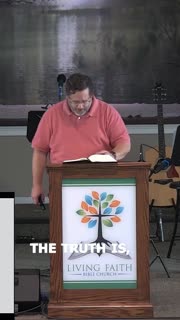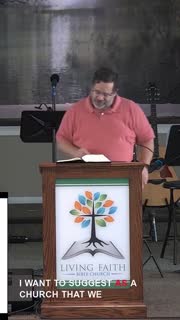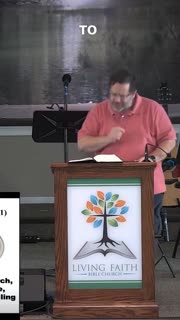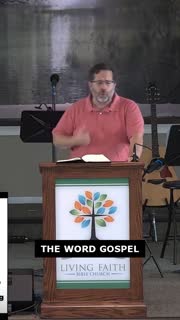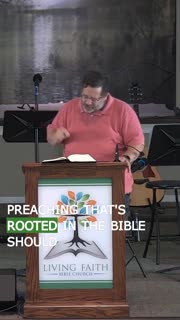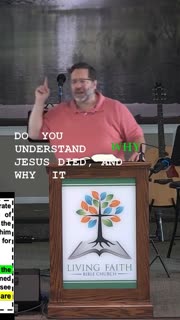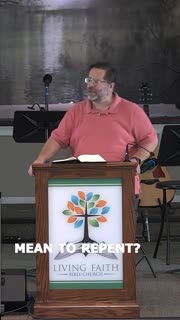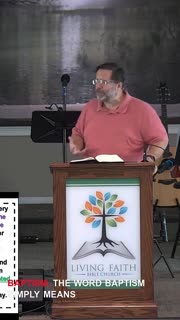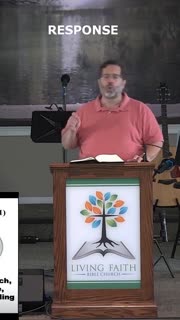Proclaiming a Gospel-Centered Message in the Church
Summary
### Summary
Good morning, Living Faith! Today, we continue our sermon series, "We Are the Church," by exploring what the core message of our church should be. Every church must decide its central message, and while some focus on political, social, or moralistic themes, I suggest that our message should be gospel-centered, focusing on the person and work of Jesus Christ. This means our preaching should be rooted in the Bible, as Charles Spurgeon once said, "The church does not determine what the Bible teaches. The Bible determines what the church must teach."
To understand what a gospel-centered message looks like, we turn to the early church in Acts 1 and 2. The first sermon ever preached by the Apostle Peter provides a model for us. Peter's message focused on three key elements: the person of Christ, the work of Christ, and a call for a response to Christ.
Peter began by proclaiming the person of Christ, emphasizing that Jesus of Nazareth was a man accredited by God through miracles, wonders, and signs. This proclamation challenges us to ask, "Who is Jesus to you?"
Next, Peter highlighted the work of Christ, focusing on His death and resurrection. Jesus' death was a demonstration of God's love and justice, and His resurrection proved His victory over death. This part of the message calls us to understand why Jesus died and what it means for us.
Finally, Peter called for a response. The people were "cut to the heart" and asked, "What shall we do?" Peter replied, "Repent and be baptized in the name of Jesus Christ for the forgiveness of your sins, and you will receive the gift of the Holy Spirit." This response involves a change of direction in our lives, turning towards Jesus and embracing His message.
As we reflect on this, I ask you: Who do you say Jesus is? What has He done for you, and how is it impacting your life? Let us pray for the courage to respond to this gospel-centered message and to proclaim it to others.
### Key Takeaways
1. The Central Message of the Church: Every church must decide its core message. While political, social, or moralistic themes may be prevalent, our focus should be on a gospel-centered message rooted in the Bible. This ensures that our preaching aligns with what the Bible teaches, rather than what we think it should teach. [02:22]
2. The Person of Christ: Peter's sermon in Acts 2 begins by proclaiming the person of Christ, emphasizing Jesus' humanity and divinity. This challenges us to ask, "Who is Jesus to me?" Understanding Jesus as both fully man and fully God is crucial for a gospel-centered message. [10:55]
3. The Work of Christ: The work of Christ involves His death and resurrection. Jesus' death demonstrates God's love and justice, while His resurrection proves His victory over death. Understanding why Jesus died and what it means for us is essential for a gospel-centered message. [16:33]
4. A Call for Response: A gospel-centered message must call for a response. Peter's audience was "cut to the heart" and asked, "What shall we do?" The response involves repentance, baptism, and receiving the Holy Spirit. This signifies a change of direction in our lives, turning towards Jesus and embracing His message. [27:23]
5. Living Out the Gospel: The early church's response to Peter's message was transformative. They repented, were baptized, and received the Holy Spirit. This transformation should be evident in our lives as well, compelling us to proclaim the gospel-centered message to others and live out our faith authentically. [29:29]
### YouTube Chapters
[0:00] - Welcome
[02:22] - The Central Message of the Church
[03:31] - Political and Social Messages
[04:40] - Moralistic Therapeutic Deism
[05:23] - Prosperity Teaching
[06:06] - Bible-Based Preaching
[06:59] - The Early Church's Message
[08:08] - What is the Gospel?
[09:08] - The Church is the People
[10:06] - The First Church Service
[10:55] - Proclaiming the Person of Christ
[16:33] - The Work of Christ
[18:01] - Proclaiming Jesus' Death and Resurrection
[27:23] - A Call for Response
[29:29] - Repentance and Baptism
[31:59] - Living Out the Gospel
[34:40] - Closing Prayer
Study Guide
### Bible Study Discussion Guide
#### Bible Reading
1. Acts 2:22-24: "Fellow Israelites, listen to this: Jesus of Nazareth was a man accredited by God to you by miracles, wonders, and signs, which God did among you through him, as you yourselves know. This man was handed over to you by God's deliberate plan and foreknowledge; and you, with the help of wicked men, put him to death by nailing him to the cross. But God raised him from the dead, freeing him from the agony of death, because it was impossible for death to keep its hold on him."
2. Acts 2:36-38: "Therefore let all Israel be assured of this: God has made this Jesus, whom you crucified, both Lord and Messiah. When the people heard this, they were cut to the heart and said to Peter and the other apostles, 'Brothers, what shall we do?' Peter replied, 'Repent and be baptized, every one of you, in the name of Jesus Christ for the forgiveness of your sins. And you will receive the gift of the Holy Spirit.'"
#### Observation Questions
1. What three key elements did Peter focus on in his sermon in Acts 2? ([10:55])
2. According to Acts 2:22-24, how did Peter describe Jesus' life and ministry?
3. What was the reaction of the people when they heard Peter's message in Acts 2:36-38?
4. What does Peter say is the response required from the people after hearing the gospel message? ([27:23])
#### Interpretation Questions
1. Why is it important for the church's message to be gospel-centered rather than focused on political, social, or moralistic themes? ([02:22])
2. How does understanding Jesus as both fully man and fully God impact our faith and message? ([11:40])
3. What does Peter's call to "repent and be baptized" signify about the nature of true repentance and faith? ([29:29])
4. How does the resurrection of Jesus serve as proof of His victory over death and His identity as Lord and Messiah? ([24:15])
#### Application Questions
1. Who do you say Jesus is? Reflect on your personal understanding of Jesus and how it aligns with Peter's proclamation. ([13:23])
2. How has the work of Christ—His death and resurrection—impacted your life personally? Share specific examples. ([18:41])
3. Peter's audience was "cut to the heart" and asked, "What shall we do?" Have you ever felt a similar conviction? How did you respond? ([27:23])
4. What does repentance look like in your daily life? Are there specific areas where you need to turn towards Jesus and embrace His message more fully? ([30:29])
5. How can you live out a gospel-centered message in your interactions with others this week? Identify one person you can share the gospel with and plan how you will approach the conversation. ([31:59])
6. Reflect on the importance of baptism as a public declaration of faith. If you have been baptized, how did it change your faith journey? If not, what steps can you take to prepare for baptism? ([30:59])
7. How can you ensure that your life and actions reflect the transformative power of the Holy Spirit? Identify one specific change you can make this week to live out your faith more authentically. ([31:59])
Devotional
Day 1: The Central Message of the Church
The central message of the church should be gospel-centered, rooted in the Bible. This ensures that our preaching aligns with what the Bible teaches, rather than what we think it should teach. Many churches today focus on political, social, or moralistic themes, but a gospel-centered message focuses on the person and work of Jesus Christ. This approach is not only biblically sound but also transformative for individuals and communities.
By centering our message on the gospel, we follow the example set by the early church. The Bible, as Charles Spurgeon once said, determines what the church must teach. This means that our sermons and teachings should be deeply rooted in Scripture, allowing the Bible to guide our understanding and proclamation of the gospel. [02:22]
1 Corinthians 2:2 (ESV): "For I decided to know nothing among you except Jesus Christ and him crucified."
Reflection: How can you ensure that your personal study and understanding of the Bible remain gospel-centered rather than influenced by external themes?
Day 2: The Person of Christ
Peter's sermon in Acts 2 begins by proclaiming the person of Christ, emphasizing Jesus' humanity and divinity. This challenges us to ask, "Who is Jesus to me?" Understanding Jesus as both fully man and fully God is crucial for a gospel-centered message. Recognizing Jesus' dual nature helps us appreciate the depth of His sacrifice and the power of His resurrection.
When we understand who Jesus is, it transforms our relationship with Him. We see Him not just as a historical figure or a moral teacher, but as the living Son of God who came to save us. This understanding should lead us to a deeper worship and a more committed discipleship. [10:55]
Colossians 1:15-17 (ESV): "He is the image of the invisible God, the firstborn of all creation. For by him all things were created, in heaven and on earth, visible and invisible, whether thrones or dominions or rulers or authorities—all things were created through him and for him. And he is before all things, and in him all things hold together."
Reflection: Who do you say Jesus is? How does your understanding of His humanity and divinity impact your daily life and faith?
Day 3: The Work of Christ
The work of Christ involves His death and resurrection. Jesus' death demonstrates God's love and justice, while His resurrection proves His victory over death. Understanding why Jesus died and what it means for us is essential for a gospel-centered message. His death was not just a tragic event but a purposeful act of love and redemption.
Jesus' resurrection is the cornerstone of our faith. It assures us that death is not the end and that we have hope for eternal life. This understanding should fill us with gratitude and compel us to share this good news with others. [16:33]
Romans 5:8-10 (ESV): "But God shows his love for us in that while we were still sinners, Christ died for us. Since, therefore, we have now been justified by his blood, much more shall we be saved by him from the wrath of God. For if while we were enemies we were reconciled to God by the death of his Son, much more, now that we are reconciled, shall we be saved by his life."
Reflection: Reflect on the significance of Jesus' death and resurrection. How does this understanding shape your view of God's love and justice?
Day 4: A Call for Response
A gospel-centered message must call for a response. Peter's audience was "cut to the heart" and asked, "What shall we do?" The response involves repentance, baptism, and receiving the Holy Spirit. This signifies a change of direction in our lives, turning towards Jesus and embracing His message.
Repentance is more than just feeling sorry for our sins; it involves a complete turnaround, a decision to follow Jesus wholeheartedly. Baptism is an outward expression of this inward change, and receiving the Holy Spirit empowers us to live out our faith. [27:23]
Acts 2:37-38 (ESV): "Now when they heard this they were cut to the heart, and said to Peter and the rest of the apostles, 'Brothers, what shall we do?' And Peter said to them, 'Repent and be baptized every one of you in the name of Jesus Christ for the forgiveness of your sins, and you will receive the gift of the Holy Spirit.'"
Reflection: What areas of your life need repentance and a change of direction? How can you take a step towards this change today?
Day 5: Living Out the Gospel
The early church's response to Peter's message was transformative. They repented, were baptized, and received the Holy Spirit. This transformation should be evident in our lives as well, compelling us to proclaim the gospel-centered message to others and live out our faith authentically. Living out the gospel means that our actions, words, and attitudes reflect the teachings of Jesus.
As we live out the gospel, we become witnesses to the transformative power of Jesus in our lives. This not only strengthens our faith but also draws others to Christ. Our lives should be a testament to the hope, love, and redemption found in Jesus. [29:29]
James 1:22-25 (ESV): "But be doers of the word, and not hearers only, deceiving yourselves. For if anyone is a hearer of the word and not a doer, he is like a man who looks intently at his natural face in a mirror. For he looks at himself and goes away and at once forgets what he was like. But the one who looks into the perfect law, the law of liberty, and perseveres, being no hearer who forgets but a doer who acts, he will be blessed in his doing."
Reflection: How can you live out the gospel in your daily life? What specific actions can you take to reflect the teachings of Jesus to those around you?
Quotes
1. "The truth is, every church must decide what its message is. Every church. Every body that gets together and has someone speaking, must decide what its message will be, what they will preach. And what I mean by that is the theme, or the emphasis, or the center of that preaching. Now some focus their preaching on a political or a social message. When I mean political, I mean centers on themes from either the right or the left." [02:22] (37 seconds)
2. "I want to suggest as a church that we stay away from those things. And over the course of our ministry of 40 plus years of faithful preaching by Pastor Fisher. And now, I've been here about 13 years. We're trying to be what? What is our preaching emphasis? We're trying to take our cue from the Bible. The content of our message should be Bible-based. And what does the Bible teach us?" [06:06] (25 seconds)
3. "I want to suggest to you this big idea that if we take our cue from the earliest church, we must proclaim a gospel-centered message. I'll explain that word in a minute. Gospel. Gospel-centered message focused on the person and work of Christ. The focus isn't me or even you. I'm sorry to insult you or to offend you. It's not about us. It's about Christ. It's a focus on the person and work of Christ, and then calling for a response to Him. From us as Savior and Lord." [06:59] (42 seconds)
4. "The word gospel in the language of the Bible is Ugelian, from where we get the word evangel, or evangelistic, or to evangelize. And it means to proclaim good news. The word evangel in the heart of it means good news. So what we're trying to say is the church should be centered in a good news message. Gospel-centered message. But the good news has to be focused on the person that brings us good news, who is Jesus. Focused on the person and work of Jesus." [08:08] (39 seconds)
5. "Preaching that's rooted in the Bible should challenge us always to ask ourselves, who is Jesus? What does he mean to me? I want to ask you that question. Who is Jesus to you? How do you understand him? And what does he mean to you? There was an Ipsos survey that was done in 2022. It was sponsored by the Episcopal Church and they surveyed people to find out their religious understandings of Jesus. They found that three out of four U.S. adults, 76%, say they believe in the historical existence of Jesus Christ or Jesus of Nazareth." [13:23] (45 seconds)
6. "Do you understand why Jesus died, and why it matters to you? This is important to understand. Why did Jesus die? The Bible says, for two reasons, if I would summarize it, I'd say, because of love, and because of justice. Love. God demonstrates his love for us in this, while we were yet sinners. Christ died for us. The Bible declares emphatically, that God so loved the world, that he gave his only son. And in the giving of his son, it involved his being born, and living, and dying. Jesus willingly gave up his life on the cross out of love." [18:41] (46 seconds)
7. "What does it mean to repent? The Bible uses the word repent to mean to change direction. To turn around and go the other way. And it means first of all to turn direction as it relates to Jesus. To say no Jesus is the biggest deal in all of the world and my life is now going to turn around and revolve around him and his priorities for my life. That's what it means to repent. And to believe, to accept the message." [30:29] (28 seconds)
8. "Baptism. The word baptism simply means to be dunked. To be immersed. And it's to be immersed in water as a symbol of this change of life. This belief you now have in Jesus as your Savior and Lord. Baptism goes back as early as the very first message of the very first church service as we see here in Acts chapter 2. It's those who receive the message. And by believing the message and embracing the message in the waters of baptism as we proclaim that message the Bible says that we have the forgiveness of sins and we receive the gift of the Holy Spirit." [31:29] (41 seconds)
9. "What is your response to what God has done in Jesus Christ? Who do you say Jesus is? And what do you say Jesus has done for you? And is it having any impact on your life? I ask the same question humbly about myself too." [32:30] (22 seconds)
